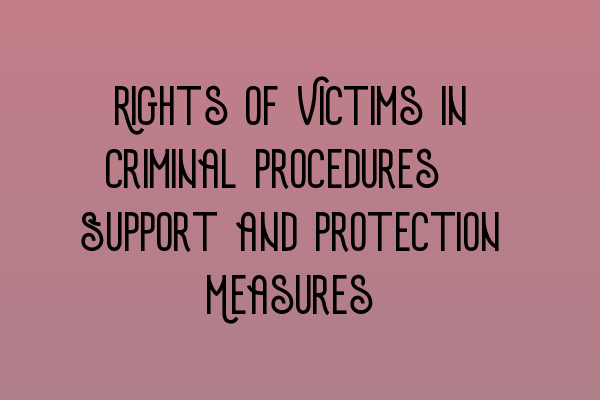Rights of Victims in Criminal Procedures: Support and Protection Measures
Introduction
When a crime occurs, it is not only the accused who requires attention and protection within the criminal justice system. The rights of victims are equally important and should be safeguarded throughout the entire criminal proceedings. In this blog post, we will explore the various support and protection measures available to victims in criminal procedures.
Rights of Victims
Victims of crime have legal rights that are recognized and protected by law. These rights include:
- The right to be treated with fairness and respect: Victims have the right to be treated with dignity and respect throughout the criminal justice process. They should not be subjected to any form of discrimination or prejudice.
- The right to information: Victims have the right to receive timely and accurate information about the progress of the case, their role in the proceedings, and available support services.
- The right to participate: Victims have the right to participate and be heard in the criminal proceedings. They may provide evidence, make victim impact statements, and express their views on key decisions, such as plea bargains or sentencing.
- The right to protection: Victims have the right to protection from intimidation, harassment, or any form of retaliation by the accused or their associates.
- The right to support: Victims have the right to access support services, such as counseling, medical assistance, and financial compensation, to aid their recovery from the crime.
Support Measures
To ensure that victims receive the support they need, various support measures are in place:
- Victim Support Organizations: There are numerous organizations dedicated to providing assistance and support to victims of crime. These organizations offer emotional support, practical advice, and guidance throughout the criminal justice process.
- Specialist Victim Support Services: Certain crimes, such as sexual assault or domestic violence, may require specialized support services tailored to the specific needs of the victims. These services may include legal representation, trauma counseling, and safe accommodation.
- Restorative Justice: Restorative justice programs aim to bring together victims, offenders, and the community to address the harm caused by the crime. These programs focus on reconciliation, healing, and providing victims with a voice in the process.
- Compensation Schemes: Victims may be eligible for financial compensation to cover the expenses resulting from the crime, such as medical bills, loss of earnings, or damage to property. There are specific compensation schemes available to assist victims in these situations.
Protection Measures
To ensure the safety and protection of victims, the following measures are in place:
- Restraining Orders: In cases where there is a risk of further harm or harassment, victims can apply for restraining orders. These legal orders prohibit the accused from contacting or approaching the victim.
- Anonymous Testimony: In certain circumstances, victims may provide their testimony anonymously to protect their identity and prevent potential retaliation.
- Victim Personal Statements: Victims have the opportunity to submit victim personal statements to the court, expressing the impact of the crime on their lives. These statements can influence sentencing decisions and provide a powerful voice for the victims.
- Secure Facilities: Victims may be provided with secure waiting areas and separate entrances to courtrooms to minimize contact with the accused and their supporters.
Conclusion
The rights of victims in criminal procedures are critical for a fair, just, and compassionate system. By recognizing and protecting these rights, we ensure that victims are supported, empowered, and able to participate fully in the criminal justice process. If you require further information or assistance regarding victims’ rights, please do not hesitate to contact our team at SQE Criminal Law & Practice Law UK.
Related Articles:
SQE 1 Practice Exam Questions
SQE 1 Practice Mocks FLK1 FLK2
SQE 2 Preparation Courses
SQE 1 Preparation Courses
SRA SQE Exam Dates
